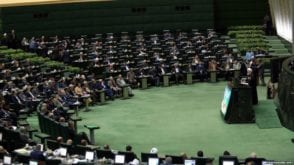Al-Monitor – Republicans on track to wrest control of the House of Representatives plan to use their agenda-setting powers in the lower chamber next year to hammer President Joe Biden on Iran and undermine already fading prospects for a renewed nuclear deal.
Republican lawmakers are expected to introduce a wave of standalone bills, as well as measures in the annual National Defense Authorization Act, aimed at further punishing Iran’s rights violators and impeding its illicit revenue generation.
A senior Republican congressional aide familiar with the efforts predicted some bipartisan support for inserting provisions into must-pass bills that would require enforcement actions and additional human rights- and terrorism-related sanctions, including on entities and individuals associated with Iran’s Islamic Revolutionary Guard Corps, the Central Bank of Iran and the National Iranian Oil Company.
There are a lot of Democrats who wanted to vote for Iran stuff and have been vocal, but the Democratic leadership never put Iran sanctions on the floor,” the aide said of the political realignment. “We can get a lot more of this stuff to the president than people realize.”
A number of nuclear deal-skeptic Democrats up for re-election last week kept their seats, including New Jersey Reps. Josh Gottheimer and Donald Norcross. And they have a powerful ally in the Senate Foreign Relations Committee’s Democratic chairman, Sen. Bob Menendez, a longtime critic of the nuclear deal, known as the Joint Comprehensive Plan of Action (JCPOA).
Iran’s continued crackdown on nationwide protests that erupted in September over the death of 22-year-old Mahsa Amini, along with its support for Russia’s war in Ukraine, have dampened prospects for reviving the nuclear accord.
The Biden administration has unleashed a wave of sanctions meant to punish the Iranian government for its treatment of the protesters, the most recent of which include designations on six senior employees of state-run broadcaster IRIB. Other sanctions have targeted Iran’s morality police, Revolutionary Guards commanders and prison officials. The administration has also gone after firms transferring Iranian armed drones to Russia.
Congressional Republicans argue the US should further demonstrate its disapproval by quitting the JCPOA talks for good. But US officials, including Biden’s Iran envoy Rob Malley, say that diplomacy remains the best way to prevent Iran from acquiring a nuclear weapon, even if the deal is off the agenda for the time being.
Behnam Ben Taleblu, a senior fellow at the Foundation for Defense of Democracies think tank in Washington, predicts a bruising rhetorical fight over the Biden administration’s refusal to fully abandon the nuclear talks.
“Expect Republicans to press on the inconsistency between words and deeds by the Biden administration on Iran: That one can’t stand with the Iranian people while holding in reserve a deal that enriches their oppressors,” Taleblu said.
Republicans aren’t waiting until next year to make their case. In a letter to Secretary of State Antony Blinken on Monday, Rep. Markwayne Mullin (R-Okla.) and five other GOP lawmakers urged him to close the door on a revived JCPOA.
“To continue to negotiate with a regime that has come to the table in bad faith is a waste of time,” they wrote.
To get The Takeaway in your inbox every week, subscribe here.
‘None of us knew’: Israeli officials slam FBI probe
Israeli officials were caught off guard by the reports that the US Department of Justice is investigating the death of Palestinian-American journalist Shireen Abu Akleh, who the Biden administration determined “likely” died by accidental Israeli gunfire.
“We did not see it coming,” a senior Israeli security source told Ben Caspit. “It simply happened, and right now we have no idea what is behind it.”
Caspit reports that senior Israeli officials placed urgent calls to their American counterparts at the State Department, Pentagon and National Security Council but received little clarification on the investigation.
Nor have journalists. The US Department of Justice has yet to comment on the reports, and at yesterday’s State Department briefing, deputy spokesperson Vedant Patel took pains to avoid confirming the investigation’s existence or whether US and Israeli officials had spoken about it.
The State Department said in July that US officials had determined a bullet fired from Israeli military lines was “likely responsible” for Abu Akleh’s death but that the recovered bullet was too badly damaged to reach a definite conclusion about the source of the gunfire.
A congressional aide for Senator Chris Van Hollen, the Maryland Democrat who previously led the push for direct US involvement in any investigation, said his office has reached out to the Justice Department to confirm reports of an investigation but did not receive any confirmation as a matter of policy.
US points blame at Iran for Israeli tanker attack
The White House wasted little time assigning blame for a suspected Iranian drone attack on an Israeli-linked commercial oil tanker off the coast of Oman late Tuesday night.
“We are confident that Iran likely conducted this attack using a [unmanned aerial vehicle], a lethal capability it is increasingly employing directly and via its proxies throughout the Middle East and proliferating to Russia for use in Ukraine,” national security advisor Jake Sullivan said in a statement Wednesday.
US Central Command said Iran had used a Shahed-series one-way attack drone in the attack. Russia is believed to have recently used the same Iranian-made drones in attacks on civilian infrastructure in Ukraine.
The apparent Iranian provocation in the Gulf of Oman on Tuesday comes after the US Navy intercepted a Yemen-bound fishing boat that had departed from Iran with more than 70 tons of missile fuel on board. As Jared Szuba reports, the first-of-its-kind aluminum perchlorate seizure is a rare win in the US Navy’s yearslong game of cat and mouse with Iran-backed arms traffickers off Yemen, suggesting the Fifth Fleet’s redoubled efforts may be beginning to pay off.
More top stories from our contributors
Recent remarks about the future status of the ethnically divided island of Cyprus has poured fresh fuel on the simmering tensions between NATO members Turkey and Greece, reports Andrew Wilks.
Fayza Hassan explains how smugglers are finding new ways to bring drugs into the Gaza Strip, including by stashing the illicit substances in potato chip bags.
Tunisia is gearing up for legislative elections in December, but there’s a serious shortage of candidates. Elizia Volkmann writes that the lack of candidates suggests a loss of faith in the parliament under embattled Tunisian President Kais Saied.
There are more ultra-Orthodox and settler politicians than ever before occupying the coalition benches after Israel swore in its most right-wing Knesset in history, observes Mazal Mualem. The opposition, however, is more eclectic.
In his latest PRO memo, Afshin Molavi dives deep on the GCC rail network, and why high oil and gas prices and the easing of tensions with Qatar has added wind to the sails of the long-planned project.
 Shabtabnews In this dark night, I have lost my way – Arise from a corner, oh you the star of guidance.
Shabtabnews In this dark night, I have lost my way – Arise from a corner, oh you the star of guidance.



